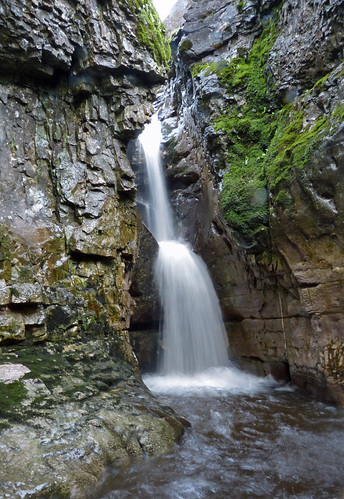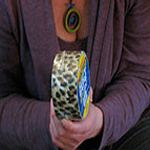
 Photo by ARG_Flickr
Photo by ARG_FlickrHey everyone! Today I wanted to do a quick post on household water drainage and how to handle a clogged drain. Yep, having proper water drainage in your household pipes is very important.
All the drains in your house will eventually find their way to the sewer. The main drain line will run from your house to either a main sewer system operated by the city, or to a septic tank buried in your yard. But either way, if you don’t have proper water drainage then you could begin getting foul smelling pipes and possible back flow through your water drainage system. Let me tell ya, that stuff doesn’t smell pretty either.
So it’s very important to maintain clean pipes in order to have the proper water drainage. This is not going to be some extensive training course in plumbing, but for anyone that lives in a home or apartment that has running water, this may be helpful in preventing a clogged sink drain or clogged shower drain.
Well, usually Fridays are the day I post a new part to my Amazing Animals of the World series. But there hasn’t seemed to be a whole lot of interest in that series, so I think I may discontinue it for now. It hit 10 editions, so that sounded like a nice round number to stop at for now. If anyone would like to see it return, please let me know. Anyway, on to the Water Drainage Goodies!
Water Drainage for the Kitchen Sink
The kitchen sink in your household probably gets more use than any other drain in the house, except maybe the shower or bathtub. So it’s very important to keep good water drainage to ensure you don’t encounter any plumbing problems.
It’s a good idea to run the faucet for at least 30 seconds a day and let that water drain through the pipes. In fact this is a good idea for all sinks in the house. One common reason that sinks get stopped up is because not enough water is being flushed through them. This is especially the case if you have a garbage disposal and use it very often. Always allow the water to run for at least five seconds after turning off the garbage disposal, this will help flush any particles down the drain.
Hot grease can be terrible for water drainage and you should never pour it down the sink. It doesn’t matter if you have a disposal or not, hot grease down your drain can cause other forms of grease like soap to congeal and can cause a clogged sewer & drain.
It is not uncommon for some grease buildup to be present in a sink drain even if you haven’t directly poured hot grease down it. So once a month fill your sink to the top with scalding hot water. Then reach in with something (not your hand or you may get burned) and remove the stopper. The hot water swirling down the drain will help remove any residue or grease buildup that may be present.
Unclog a Plugged Toilet
Your toilet is another thing that will possibly get clogged with foreign objects. So never put anything down there that doesn’t belong. Your natural goodies and toilet paper are the only recommended items that should pass through your toilet.
Be sure to never try and flush q-tips, baby wipes, plastic items or any course paper products. These objects will cling to the roots in the sewer and can cause immediate blockage in your sewer lines. This can cause poor water drainage between your home and the main sewer line.
If you do get clogged from foreign objects like the ones mentioned, it is very expensive to have a professional come out and remove them.
Water Drainage: Signs that It’s Gone too Far
It’s a common misconception that a slow moving shower drain or sink drain means that you actually have a clogged drain somewhere. It may simply mean that your lines need to be cleaned. You can try a little vinegar and baking soda and follow that with boiling water, but if that doesn’t work consult a professional.
There are a few sure fire signs to a sewage or septic clog.
- Water will back up from your tub when ever you flush the toilet.
- When emptying the bathtub, water drainage may stop or may possibly bubble back at you either through the tub drain or even the toilet.
- Emptying your kitchen sink may cause water to back up into the toilet.
- Flushing the toilet may cause sewer water to back up through other household drains such as an outside downspout, patio drain or through house foundation water drainage.
- You may notice soapy water backing up through your toilet, shower or floor drain when doing laundry.
Never use Chemicals to Treat your Clogged Drain
First of all, drain cleaning chemicals are quite dangerous and toxic to keep in your home. Not only are they dangerous to children and the environment, but if they splash onto your skin or in eyes, then you have a severe problem on your hands.
There are many instances where someone will try to use these drain chemicals to fix their clogged sink drain instead of calling a professional. But what happens is, they wind up calling a pro anyway because the chemicals will not wash free. The professionals will know how to deal with chemical clogged drains, but by all means never try to run a hanger or cable through a clogged drain that has chemicals in it.
What happens is, when the chemicals enter the clogged drain, they can solidify and make it worse. This usually happens when there is something blocking the line that the chemical can not eat through. Then the chemical will sit behind the clog and crystallize. There is no easy way to clean a clogged drain once the chemicals have hardened in it.
This will normally lead to calling a plumber out to fix the pipes. So if you’re going to call one anyway, why not call them first if you are unable to fix the problem with a simple flush with vinegar, baking soda and boiling water. This will save you money in the long run because the chemical clog will make much more work for the plumber, which means they will charge you more!
One more thing to keep in mind when attempting to rescue your water drainage with chemicals is what they can do to your pipes and drainage system. Such chemicals can eat through copper, dissolve rubber gaskets and even cause galvanized pipes to corrode. Even though they are this destructive, they normally will not be able to eat through the simplest clog of a potato peel. I know, it sounds crazy but it’s true.
So the best fix for poor water drainage is of course preventive maintenance. Not to get the clogged drain in the first place is the key. Be sure to run your faucets on a regular basis, at least 30 seconds a day and fill your sinks with hot water and let it drain through to help flush down any foreign substances. If you do experience a clogged drain or you think you’re getting a clog, then try the vinegar, baking soda and boiling water flush first. And if none of that works, by all means call the professionals and leave the nasty chemicals out of it, unless you like learning the hard way.
I know, I know, some of you may disagree with this, but to each his own. I would love for you to share your experience either way, whether you are for or against chemical cleaners. Let’s have those opinions folks. 🙂



That waterfall picture, that’s how my toilet looked last week. It overflowed. If I read your tips earlier, that would not have happened!
Very sorry to hear about your bathroom mishap Matt. But it’s never too late to start the routine maintenance.
Very informative article Robert. I agree with you that we should let the water run to the drains for 30 seconds every day, to make sure they are clean.
Hey thanks! I must add that anyone looking for this information should check out your post as well, thanks for leaving the commentluv link to that. 🙂
You can also get those pipe augers to physically push down the material that is clogging the pipe.
Yah those do work pretty good. We had our drain line to the washing machine clogged up pretty badly here a while back. They used one of those rooters to push it through and it worked pretty well. But it took them a while because the clog had probably been building for a while and was really packed in there! I thought those guys were gonna kill themselves before they got through, had two of em in there grinding away for a few hours…lol
But yes, those will definitely get the job done Tanner, thanks for mentioning that!
Keeping the drains in check on a regular basis is a great idea! In America they tend to have cleanouts which would be the best option to clear a drain, a simple set of $20 drain rods should clear a blockage. In England we would just use the manholes. Much more convenient. These options save chemicals going down the drain and actually physically clear the blockage 🙂 Great post sir!
Thanks for stopping by Ben.
We have a few manholes here in the States, but I don’t think most of them give full access to the sewage. That would definitely be a more productive method for cleaning out the drains. There is a lot of heavy usage of chemicals here for unstopping drains, which is terrible for the pipes in the long run.
I have had to call out the septic service in Seattle WA a few times for problems we have had at our house. They say that something is wrong with the pipes but it would cost so much to get it fixed that I’m not sure what to do.
Hi Shelly, and thanks for stopping by.
I’m sorry to hear you are having trouble with your septic system and pipes. Sometimes plumbing problems may reach a degree that repair by a professional is the only recourse. That further validates my concerns with preventive maintenance. Unfortunately plumbers do charge a pretty high rate for a service call. Hope things work out ok for you.
A clogged toilet can be incredibly frustrating and messy. Fortunately, you can take care of most clogged toilet repair without needing to find a plumber. Finishing your clogged toilet repair is often very simple and cheap. Just follow these easy steps and you’ll have that toilet repair completed by the time your guests arrive.
Absolutely Tom, it’s not always necessary to call the professionals. The main thing in my opinion is maintenance and preventing the clog in the first place. Glad you stopped by to lend a voice on the subject.
It is good to keep your house free from flooding.
I quite impressed to read your article @robert, that’s sound amazing. I my view sometimes a small blockage could be cleared by plunging with a mop or use of a stick, I thing you agree with my terms.
Thanks.
Absolutely Darrel, I agree most times these small clogs can be cleared with little effort. Definitely would be better than resorting to chemicals or calling in a professional.
Thanks for your kind reply @robert
Hello Robert, Thank You for your article! As we see it is really important to know how to keep the nature around us as much chemical free as we can. As part of it, it is important to know how to recycle all that trash that humanity is producing. Thank You again Robert, for your tips, I’m definitely gonna use them from now on!
You’re quite welcome Natasha. I have to agree that keeping things as natural as possible is a big part of saving the Earth. Chemicals are harmful not only to use but to keep in your household as well. Thanks for commenting!